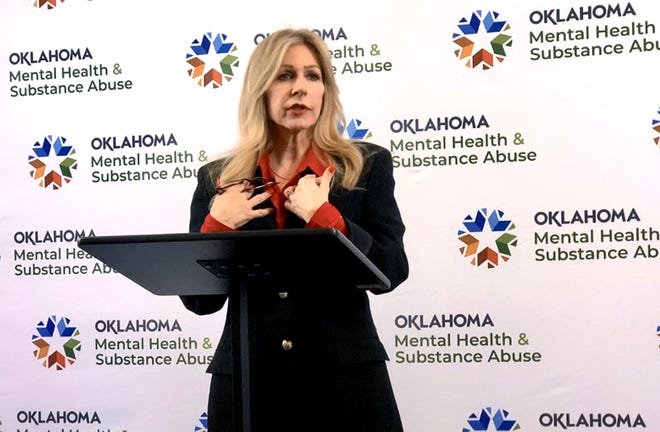With a crisis call center vendor selected, Oklahoma is preparing for the July launch of 988, a new national three-digit phone number for people to call in a mental health crisis.
The state Mental Health and Substance Abuse Services Department announced last week that it has selected Arizona-based Solari Crisis and Human Services to operate Oklahoma’s 988 call center.
The state’s mental health commissioner wants 988 to address and de-escalate mental health crises in the moment, but also to serve as an entry point to connect with other mental health resources. Depending on a person’s needs, that could look like dispatching a mobile crisis team or setting a follow-up appointment with a local treatment provider.
The launch of 988 is part of the state’s comprehensive crisis response plan and comes at a critical moment. During the pandemic, demand for all levels of mental health care — from over-the-phone crisis intervention, to psychiatric urgent care, to inpatient psychiatric care — has grown “so, so much,” said Carrie Slatton-Hodges, the state’s mental health commissioner.

Currently, if someone in Oklahoma calls the National Suicide Prevention Lifeline, the call is routed to one of two crisis centers in the state: either Heartline in Oklahoma City or Family and Children’s Services in Tulsa.
But if those local centers can’t pick up, the calls are then routed to a national backup center. In 2020, about a fourth of calls to the Lifeline from Oklahoma were answered outside of the state.
When calls are pushed to backups out of state, Oklahomans in crisis may have to wait two to three times longer for someone available to talk with them, are more likely to abandon their calls and are less likely to get connected to local mental health services, according to the Lifeline.
Once Solari is managing the state’s 988 call center, those calls will be answered by Solari’s staff, with Heartline and Family and Children’s Services as backup if Solari is at capacity, Slatton-Hodges said.
Slatton-Hodges said working with Solari will mean much greater capacity for the state’s mental health crisis response. She said she anticipates Oklahoma will be able to handle nearly 100% of its calls in-state — meaning very few would roll over to national call center backups.
Preparing for 988
Mental health advocates and experts expect to see an increase in crisis calls as more people become aware of 988. For some states already struggling to keep up with demand, that may pose an issue.
“States that have no infrastructure around (988) — all they have is the national suicide hotline — and they’re not building infrastructure preparing for July 1, I think are going to be incredibly overwhelmed,” Slatton-Hodges said. “But I feel like in Oklahoma, we will be ready.”
Slatton-Hodges said state mental health leaders have long looked toward Solari’s work in Arizona as an example of a strong crisis intervention system.
Using mental health grants the state has received as part of COVID stimulus funding, the state will pay Solari about $5 million in its first year running the statewide call center, and then about $3.5 million per year for two years after that, a spokesman for the department said.
Solari launched in 2007 offering crisis-line services in Arizona and since then has expanded into offering other services in the state, like running a 24/7 peer support “warm line,” and dispatching mobile crisis teams, said Beth Brady, Solari’s senior director of brand development and education.
The company has consulted with other states to assess their crisis systems and implemented their crisis center technology, but running the 988 call center in Oklahoma will be Solari’s first time running a full crisis line outside of Arizona, Brady said.
“We’re so excited to get moving to Oklahoma and getting to know all the good work that’s already happening there,” Brady said.
She said having a three-digit number to call in a mental health crisis will make a “world of difference” for people being able to access care, and for breaking down stigma around mental illness and suicide.
Solari staff members answering Oklahoma’s 988 calls may come from a variety of backgrounds, but the company focuses on hiring people with a combination of mental health experience and education.
“Sometimes those folks may be licensed professionals — such as a licensed social worker or licensed counselor,” Brady said. “But it could also be someone who has a bachelor’s degree and maybe some years’ experience as a case manager or working in the mental health field.”
Crisis center supervisors are all licensed mental health professionals who can step in if a call-taker needs extra support, she said.
Solari will hire for 31 positions and is working to establish its new location in Oklahoma City.
Get help
Before 988 launches this summer, the number is not currently active.
To reach the National Suicide Prevention Lifeline before then, call 1-800-273-8255 or go to suicidepreventionlifeline.org.
The Crisis Text Line is also available 24/7 by texting HOME to 741741.